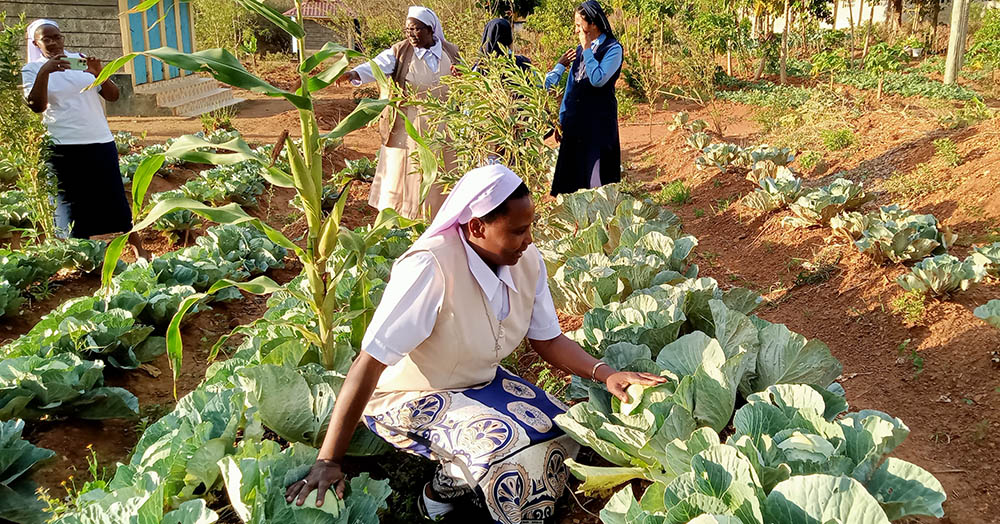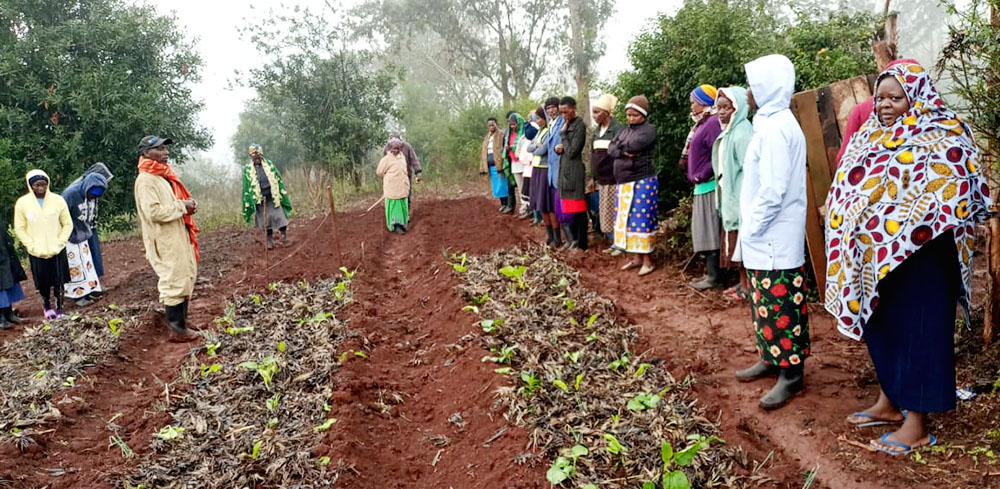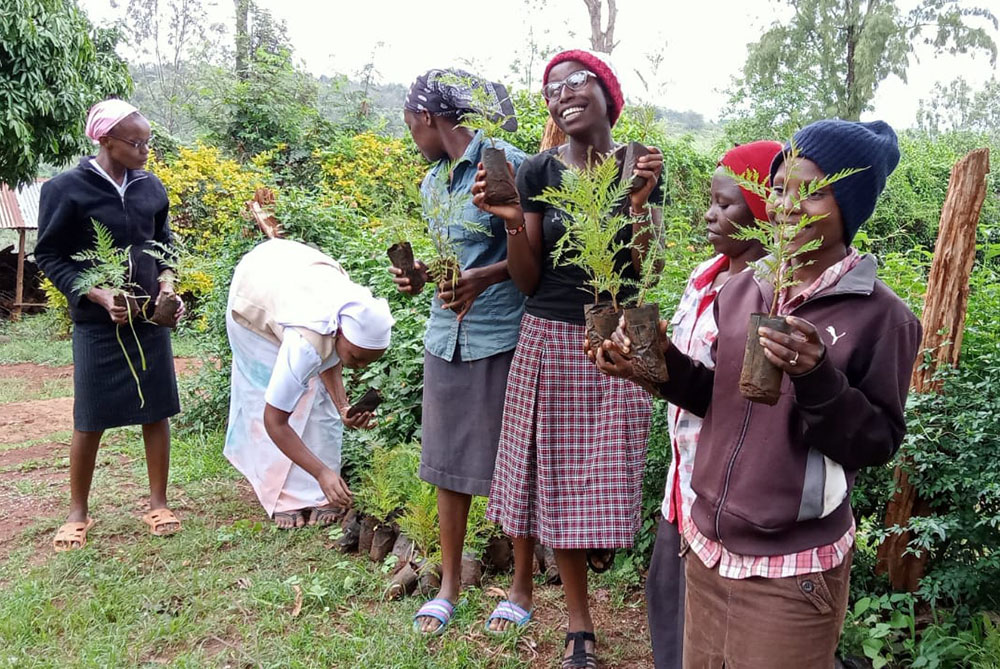
Sisters of St. Joseph of Tarbes, who sponsor a project on "Regenerative Agriculture Through Sustainable Farming Methods" in Kenya, harvest cabbages. (Courtesy of Josephine Kwenga)
As we sit down to reflect on what receiving the prestigious People's Choice SDGs Award means to us as the Sisters of St. Joseph of Tarbes, we are compelled by how this award was an exceptional experience of communion for us, not only in Kenya, the project location, but the entire St. Joseph of Tarbes family.
The Sisters of St. Joseph of Tarbes are a pontifical congregation of women religious founded in France in 1843 by six young girls who had a special experience of God, urging them to live a life of contemplation. The six foundresses, by their founding spirit, make a strong inspiration for the strong value in community life for the St. Joseph of Tarbes family and consequently the charism of communion (John 17:21).
From France, the congregation spread with services to other continents, including Africa. The first sisters of St. Joseph of Tarbes came to Kenya from India in 1982, and today we are present in nine dioceses and archdioceses with 18 mission stations or communities, where we are involved in various services among our brothers and sisters in the church and the society.
As a Sister of St. Joseph in Kenya, I am deeply passionate about empowering Indigenous farmers and fostering sustainable agricultural practices to address the pressing issues of food security and environmental conservation in our target regions. The project I lead is titled "Regenerative Agriculture Through Sustainable Farming Methods."
Advertisement
In Kenya, the agricultural sector is the backbone of the economy, contributing significantly to the country's gross domestic product and employing over 40% of the total population, with 70% residing in rural areas. Agriculture is a source of livelihood, employment, income, and food security for more than 80% of the Kenyan population.
Despite its crucial role, the dynamics of poverty are reshaping the landscape, with 46% of the population living on less than US$1 a day, 36.5% facing food insecurity, and 35% of children under 5 experiencing chronic malnutrition.
Climate change exacerbates the challenges faced by farmers, particularly those accustomed to rain-fed farming systems. Many are compelled to migrate to dryer and more marginal areas, increasing their vulnerability to drought and unpredictable weather patterns.
Witnessing these challenges, I decided to promote regenerative agriculture, specifically through the practice of the permaculture method.
During the COVID-19 pandemic, when numerous low-income families struggled to put food on the table, I successfully implemented the permaculture method. The initiative provided a means of livelihood, especially for local poor communities who were faced with challenges of food security and economic instability.
Encouraged by the positive impact, I assembled a team of 12 like-minded farming partners to scale up our efforts, reaching more farmers in different villages across Kenya.

As part of the "Regenerative Agriculture Through Sustainable Farming Methods" project, Kenyan farmers are trained on the preparation of double dig beds and companion planting. (Courtesy of Josephine Kwenga)
The project received support from the Hilton Foundation, enabling us to extend our reach and create awareness about regenerative agriculture. Together, we strive to empower farmers, enhance food security, and contribute to environmental conservation in our beloved country.
So, right before the announcement of the 2023 People's Choice SDGs Awards, I was holding my breath in prayer and hoped to be called out as the winner so that I would have an opportunity to share with the world about the sisters' contribution to development. Lo and behold, our Regenerative Agriculture Through Sustainable Farming project attained the prestigious People's Choice SDGs Award.
Shortly after the ambiance of victory and the receipt of the exciting news, the togetherness at our convention was overwhelming. We could hug and embrace each other with gratitude as my phone was also overflowing with congratulatory messages.
It was unbelievable how the sisters, especially in my community, have remained smiley, happy, motivated and in a wonderful mood since then. We can truly say it was such a monumental experience.
Now, unlike before, the majority of us are committed to supporting the project idea as we look forward to having it happen again in one way or another. That is, the experience has continued to encourage us on the need for perseverance and resilience in our daily efforts and ministry endeavors, particularly those aiming to eradicate poverty in our communities.
I personally knew and strongly felt that we had a winning chance because as a coordinator of our development programs, I had always prayed and believed in this project. At the same time, attending the ceremony and listening to other winners, I was well aware that other participants had projects with remarkable merits and I appreciate all the more than 60 participants.

Sisters of St. Joseph of Tarbes and women in formation plant trees to mark Environment Day in Kenya on June 5, 2023. (Courtesy of Josephine Kwenga)
I would like to thank the almighty God for seeing us through and crowning our efforts to sustainably serve his people and support our mission, especially our formation house in Nyeri, Kenya. Sustainable farming is greatly subsiding our bills as well as offering opportunities for the poor neighbors to learn and support themselves to improve their crop production, health, livelihoods and the environment.
Having been exposed to a global audience, I believe our greatest setback in executing this project will be gradually sorted out. I also believe this award may have attracted the attention of interested donors across the globe, not only as a way of fundraising but also as evangelization.
It was thrilling and exhilarating to share the competition arena with participants from other countries. Their projects were sound, satisfying and in line with our mantra for sustainable development. It was sensational how innovative all participants were as we all strive to create a better world for the current and future generations. We say bravo to all participants.
On the other hand, it was amazing as we, Sisters of St. Joseph of Tarbes, engaged in the whole exercise of voting for our project. The exercise not only united us all over the world, but it also became a platform where we shared a lot and held discussions among ourselves regarding the remarkable merits of the project idea. Some of our sisters from Uganda visited the project in Kenya to benchmark and learn from this initiative and each other. I could clearly see the strong connection between the words peace, development and communion.
The Sisters of St. Joseph of Tarbes have gained a great deal of self-confidence by merely attracting the attention of the global audience with "Regenerative Agriculture Through Sustainable Farming."
Ultimately, this experience has significantly enhanced the spirit of our charism of communion for us Sisters of St. Joseph of Tarbes and also made us grow in the spirit and the call of the just-concluded session of the synod on synodality through teamwork and great collaboration with other development partners and promoters of the environment.
My joy and gratitude are so immense as I share this story because, for more than three years, I have always been aspiring to showcase this project not only at a national level but also at a global level. Indeed, my aspiration has come true, and my dream realized.
Thanks to the Journalists and Writers Foundation in the margins of the 78th Session of the United Nations General Assembly in September 2023 for hosting this competition. I look forward to more partnerships and collaboration with them and to synergize in creating greater impact in our world through the implementation of the various aspects of the sustainable development goals.




